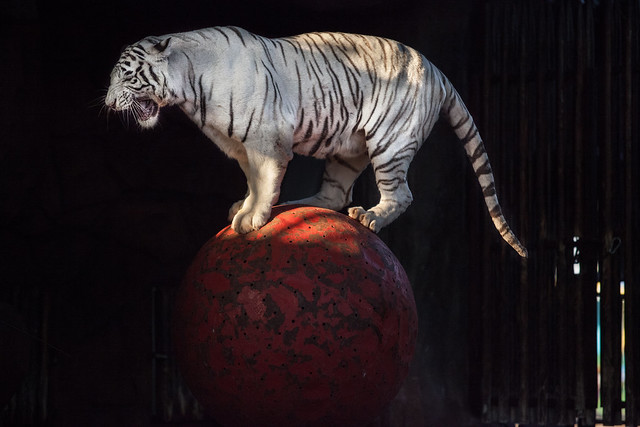Think animal performances are banned where you live? Think again.
11 March 2015
By Dave Neale, Animals Asia's Animal Welfare Director
Unless you live in Bolivia, Bosnia-Herzegovina, Cyprus, Greece or Malta, then the cruelty of animal performance remains a possible issue for you.
Yes, that’s right – these five small countries are the only ones in the world to have enacted a complete ban on all forms of animal performance.
Strong campaigning has resulted in successes in a further 14 countries which have banned the use of wild animals in performances.
But the numbers are still far too small, with most of the near 200 other countries across the globe having a variety of partial bans limiting performance to certain species, animals raised in captivity or bans limited to certain provinces, states, counties and areas.
This means that in reality, the animal cruelty inherent in animal performance remains a global issue.
And the cruelty is shocking.
Tens of thousands of wild animals around the world continue to be used in performances at circuses, zoos and safari parks. Behind the façade of entertainment, they are routinely abused, neglected and malnourished.
The techniques used to force animals to perform are often cruel and abusive, while animal welfare standards are ignored.
Animal performance and its eradication does not follow linear lines of “development”. In fact richer countries can mean animal performance is even bigger business with more powerful friends.
Just last week, a bill to see wild animals banned from circuses in the UK failed for the twelfth time. A poll by the Department for Environment, Food and Rural Affairs suggested that the move had the support of 94.5% of the British public, but continues to be blocked by a tiny coterie of MPs.
In the US too, this month brought widespread coverage of the news that the country’s biggest circus, Ringling Bros would phase out the use of elephants. While a welcome development, we must bear in mind that the company has no plans to stop the exploitation of other species and that Ringling Bros remains far from cruelty free.
Films like “Blackfish” may have united us in opposition to cruelty for the sake of entertainment but, while animal performance remains big business, there will be those motivated to maintain the status quo.
But change must come. You could even argue it’s inevitable – just as soon as everyone stops attending animal performance.
And that’s why Animals Asia’s No Voice No Choice campaign is so important.
We must make sure that no one is watching so there is no financial reward for those perpetuating animal cruelty.
Animals continue to be poached and trafficked from continent to continent for the circus industry, and there is a danger that any country “retiring” their performance animals will sell them to a still-legal industry in another.
A global campaign is the only solution for cruelty on an international scale.
Cruelty knows no borders – but then the resolve of animal lovers knows no limits.
Together we can end animal performance around the world – and end the suffering for tens of thousands of animals.
BACK









 Healing the hidden wounds
Healing the hidden wounds
 Early summer awakening at the China Bear Rescue Centre
Early summer awakening at the China Bear Rescue Centre
 5 reasons the dog meat trade must end
5 reasons the dog meat trade must end